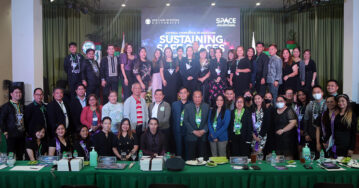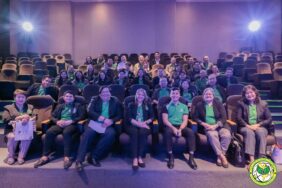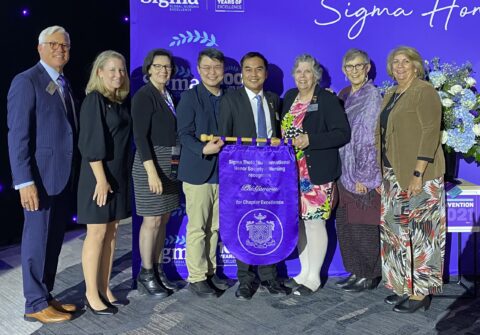10 September 2021
There has been much debate on holding face-to-face classes in the middle of the COVID-19 pandemic. For students, it seems to be a “damned if you do, damned if you don’t” scenario especially for those in the medical and allied medical programs where face-to-face (F2F) learning becomes requisite at a certain point if they are to gain the necessary experience. For parents, it is fear for the safety of their children. For educational institutions, F2F entails massive investments in retrofitting facilities, as well as very conscientious planning and implementation of safety protocols, curricula, scheduling, and blended learning.
With these as the backdrop, the University of the Philippines’ TVUP staged the webinar, “Limited Face-to-Face School: Ligtas Ba?”; gathering the perspectives of school, student, and government.
Serving as a starting base for the discussions, the Commission on Higher Education’s (CHED) very own Atty. Cinderella Filipina S. Benitez-Jaro opened with the CHED initiatives that had been launched in support of flexible learning, namely: CHED Memorandum Order No. 4 that details implementing guidelines on the implementation of flexible learning; PHL-CONNECT, a website that gives free access to instructional learning materials; CHED HiEd Bayanihan, a series of free virtual trainings on flexible learning; and, the CHED Smart Campus Development Project, grants for state universities of colleges to upgrade technology software/hardware and facilities. However, while these supportive actions on flexible learning have been put in place, Atty. Benitez-Jaro underscored, “…there are courses that would still require face-to-face delivery in order to achieve key learning outcomes and ensure readiness and competitiveness of graduates in the world of work.” Hence, ushering in CHED’s Joint Memorandum Circular No. 2021-01 that states, “This issuance shall serve as a guide for HEI’s intending to hold limited face-to-face classes during the COVID-19 pandemic and are willing to assume the responsibilities for the reopening of their campuses based on their capability to comply with health and safety protocols, to retrofit their facilities, and to get the support of their stakeholders.”
Atty. Benitez-Jaro shared that as of 31 August 2021, there is a total of 130 higher education institutions (HEI’s) that have been granted the certificate of authority to conduct limited face-to-face classes. The CHED Director IV added that, out of the number of students who have gone to school for face-to-face classes, only 0.34% became COVID positive with all these cases being mild/asymptomatic. It will be remembered that Our Lady of Fatima University served as CHED’s template in 2020 for this learning setup and, subsequently, became one of the first universities to receive authorization to hold limited face-to-face classes beginning with the graduating batch of its College of Medicine in March 2021, and followed by the College of Nursing in June 2021.
There were three guest speakers in the webinar: Dr. Carmencita D. Padilla, Chancellor of University of the Philippines-Manila (UPM); Dr. Caroline Marian S. Enriquez, President of Our Lady of Fatima University (OLFU), and Dr. Ma. Cristina D. Padolina, President and Chief Academic Officer of Centro Escolar University (CEU). All universities mentioned showcased their retrofitted facilities; smaller F2F class sizes with carefully mapped out schedules to minimize overcrowding; installation of the requisite community safety protocol signage and equipment; the required Philhealth ID or health insurance for students; the required RT-PCR tests, and COVID-19 vaccination for F2F participants, among others.
UP Manila
Dr. Padilla began by sharing UP Manila’s various stakeholders; their algorithm in handling suspected or high-risk COVID cases; their designation of nurse coordinators and focal persons for COVID concerns— averring that such guidelines have given their community some sense of safeness somehow.
Notably, Dr. Padilla introduced their internally developed application called the BEST (Bayanihan na Employee Symptoms Tracking) System, describing it as being utilized by both employees and students alike as UPM’s way of monitoring the health status of F2F stakeholders.
Showing snapshots of laboratory-based simulation classes in physical therapy, occupational therapy, and speech therapy, Dr. Padilla noted that the retrofitting project for the College of Dentistry is the most expensive yet; already posting a Php19.0 million expense midway through. For Anatomy, she said the acquisition of state-of-the-art virtual digital dissection equipment was one example of how UPM had to act quickly in response to the limitations and hazards posed by the COVID-19 pandemic.
Finally, Dr. Padilla presented UP Manila’s College of Public Health which had been designated by CHED to set up the Public Health Experts Group (PHEG) whose mission is to ensure the “conformity and compliance of State Universities and Colleges (SUC’s) and of LGU’s with proper health guidelines on the use of school facilities as quarantine centers.” CHED-PHEG is also responsible in training evaluators tasked with inspecting HEIs with regards to their readiness in conducting F2F classes.

Our Lady of Fatima University
Tackling OLFU’s College of Nursing, Dr. Enriquez spoke of the HANDS-ON @ Fatima concept which she pointed out is incorporated into the college’s learning continuity plan; a “limited F2F activity that combines online activities with hands-on clinical rotations completed within the prescribed RLE hours”. HANDS-ON means High fidelity simulation using Adaptive technology with the Networks, that is Dedicated to Structured Learning by Optimizing Nursing competencies. “It is a coined acronym which represents the combination of blended technology, and enhancement of patient care; that enhances the cognitive, the psychomotor and effective domains of a beginning nurse professional.”
Moving on to demonstrating high-fidelity simulation at OLFU, Dr. Enriquez introduced the school’s high-fidelity manikins imbued with human anatomical and life-like attributes starting off with “Hank” who can communicate based on specific cases programmed into computers. Another manikin is a birthing female who can express pain or anger and can simulate normal or cesarean delivery. Then, there’s “Hal”, a manikin that has over a hundred heart and lung sounds.
Speaking of OLFU’s use of Adaptive Technology, Dr. Enriquez described this as “tweaked” versions of already existing technology so that it enables students to still interact with the technology. Such entails subscriptions to learning platforms such as Learning Pathways and Nursing Clerkship— both online and precursors to the F2F experience. What these do is to familiarize the students with the lessons and maneuvers, virtually, prior to the actual F2F classes. This way, students come to their face-to-face sessions with prior knowledge and a higher sense of confidence because there is some familiarity already.

Presenting OLFU’s SLE or Structured Learning Experience, Dr. Enriquez spoke of the nine-step approach, namely: 1) Define WHAT to teach; 2) Discuss HOW to teach; 3) Formulate learning GOALS; 4) Design the course; 5) Identify RESOURCES; 6) Determine appropriate TECHNOLOGY continuum; 7) Create the TEAM; 8) Communicate, and 9) Evaluate and innovate.
On the topic of smaller class sizes, Dr. Enriquez states, “If there’s one thing I can say about the COVID situation, education has been very personalized and individualized because it functions in small groups. So, we advise our students that once it’s your turn to go for your face-to-face education, make the most out of it because you have your teachers’ attention exclusively for you in your small group.”
Alcohol dispensers, temperature scanners, double-masks are just a few of the many safety measures put in place to make all F2F participants safe within the campus environment; but Dr. Enriquez also raised the importance of the role of the university’s Health and Wellness Team which ensures that students’ health and welfare are strictly monitored, and is ready to implement the appropriate protocols to any given health and safety situation.
In closing, Dr. Enriquez declared, “So the policies are in place, the procedures are in place. We’re just hoping that when the situation again will be safer, our students will again be able to come back safely to our campuses. We are indeed really grounded by the reality of times; that to make sure that face-to-face can happen safely, all the safety protocols have to be followed. But, at the same time, we are hopeful that, by following all these safety protocols, we will be able to bring back most of our students for the requisite and the much-needed hands-on experience that we hope that our students in our health programs like Medicine, Nursing, Medtech, Pharmacy, also Dentistry, will be able to experience.”

Centro Escolar University
Dr. Padolina started with encapsulating their F2F initiatives in the “reformulation” of the acronym “CEU” to Continuing Education Engagement in the University.
Narrating that their Dentistry graduating batch of SY 2019-2020 failed to graduate last year due to the debilitating impact of COVID-19, such propelled CEU to reinvent itself and navigate the challenges presented by the pandemic.
As she enumerated the various safety protocols set in place, Dr. Padolina noted, “We also had many consultations— first of all, with our faculty because they’re the ones who will be the frontliners there in our classrooms. But we have many consultations with parents and students, and there was a lot of hesitancy at first. But we were able to gradually encourage them; and, also with the development… the coming of vaccines to the Philippines—- that more and more agreed to come for the face-to-face classes.” This starting point led them to planning out the class schedules and the 4/10 cycle where 4 days are spent F2F, and 10 days spent online.
Riding public modes of transportation are not allowed, according to Dr. Padolina. Faculty, support staff, as well as, students, are advised to take private modes of transportation or to walk to campus. Those who cannot comply are advised to relocate to dormitories duly accredited by a third-party partner agency.
For the College of Dentistry, F2F learners can actively learn about periodontics (scaling and polishing on the perio jaw, restorative dentistry, and oral surgery.
With the CHED authorization to conduct F2F classes, Dr. Padolina was pleased to announce that their Dentistry Batch 2020 will be graduating in September 2021, putting them on track for the upcoming licensure examinations in December.
In capping off her talk, Dr. Padolina re-echoed the query, “…The first question was, ‘Ligtas Ba? May kasiguruhan ba?’ Talagang kailangan lang ng sobrang ingat lang sa bawat isa. Bawal talaga ang makalingat. At gawin lahat ng kaya. The rest… let the Lord take care of the rest.” (“The first question was, ‘Is it safe? Is there an assurance?’ Simply, each one must exercise extreme care and caution. One should not let one’s guard down. And do everything in our power, and let the Lord take care of the rest.”)

Student Reactions
Invited to share their perspectives as students, UP Manila intern, Dr. Rani Allyna Domingo affirmed that their sense of security was beefed up by compliance with protocols such as proper pre-orientations, proper fitting and allocation of masks and personal protective equipment, and RT-PCR testing for the whole batch; showing that the school was exercising the highest standards of precautionary measures and was aligned with CHED guidelines. Domingo also noted that UPM’s F2F bridging programs (just like what OLFU is doing with their manikins, she said) prior to the actual internship at the hospital help them acclimatize beforehand— it aids in easing them in from what they learned virtually and into real life, hands-on practice. Other safety protocols such as class rotation, smaller class sizes, the UPM BEST health monitoring app, the designation of student safety officers are also some initiatives that receive the thumbs-up from Domingo.
CEU’s graduating Dentistry student Daniel Louise Puspos echoed the F2F journey outlined by their university president. “And, overall, the translation of these protocols in real life— personally, I think the protocols were properly set and face-to-face classes could be possible. It is up to the clinicians, and everyone involved on how it will be implemented and followed. We should learn not to be afraid and learn to deal with what we are facing right now, and we can never fully avoid the risks, but we can definitely manage it,” Puspos stated.
The Forum
During the panel discussion, host Dr. Susan Pineda Mercado asked the guests what priority interventions they had in mind, assuming the government would provide unlimited resources.
Dr. Padilla of the UPM said vaccination and campus expansion that allows them to create a truly safe and effective “bubble” would be top on her list. While OLFU’s Dr. Enriquez responded similarly with vaccination as a priority, she also rallied for technology as a priority area because it would allow delivery of education whether students are off-campus or F2F simultaneously; hence, addressing issues that are bigger and beyond the current COVID-19 pandemic.
Dr. Padolina of CEU agreed that technology was a keen need, coupled with improving internet connectivity in the Philippines, and free RT-PCR testing.
Medical intern Rani Domingo advocated for adequate provision of personal protective equipment and vaccination, not just for the students but also for their patients with whom they interact. On the other hand, dental graduate Daniel Puspos called for investments into technology like internet access, reliable connections, bandwidth, mobile data, mobile load, gadgets, and even financing to avail of these tools. With the assumption of unlimited government funding, he also hopes for the retrofitting and upgrading of clinical laboratories to the highest standards such as negative air pressure, hepa filters and similar equipment that would help prevent infection, as well as adequate and quality standard PPEs and effective dental chair site training.
The Closing
“So, to parents and students, participate in dialogues with administration. Give all your concerns but, on the other hand, please also remember that you must also bear some of that responsibility, and you cannot give everything to the school because you are part of that community. So, let’s all contribute to do our part.” – Padolina, CEU
“So, basically, we don’t know when the pandemic will end or what the future lies for each of us… what we can do about education. However, we should not let the situation control us. We should be able to be in control of the situation and all the challenges, the adversities that come along with the COVID-19 scenario. And how do we do this? By being responsible for ourselves and following all the protocols, all the regulations that are needed. And at the same time making sure that it’s not ‘it just has to be done’, but it has to be a whole-of-nation approach. It’s not just, ‘I’m doing this in the campus because it’s needed in the campus’— but wherever I go, I will need to follow the protocols; be it on the public transpo, be it in the marketplaces, be it at home. That’s the only way I think we can curtail the COVID and its adverse effects. And, hopefully also, we find ways by which we learn to be accountable for our actions and help others also be accountable for their actions.” – Enriquez, OLFU
“But my bigger message now is planning for the future, and this is a message for government— we really have to plan for this pandemic. There will be another disaster. There will be another pandemic. We cannot wait while others are addressing the problems of today, we really need another group to think of how do we become a resilient school, a resilient society, a resilient community— so that there will be no disruption to the education of the health professions. And not only the health professions but for all. So, at the end of the day, we all have to do our share, and for today, based on the webinar— trust the administration; we are doing our best.” – Padilla, UP Manila
——————-
This webinar was hosted by Dr. Susan Pineda Mercado- Adjunct Faculty of the UP Manila National Telehealth Center, and Dr. Raymond Francis Sarmiento- Director of the UP-NIH National Telehealth Center.



